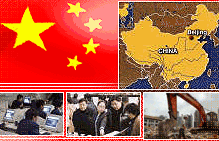Is lowering tariff and adopting an open policy a good thing? Is a Free Trade Agreement (FTA) good for our country? Someone commented that since in most countries, including the developed ones, protectionism in the forms of tariff, subsidies and quota still exists, it can therefore be concluded that protectionism is in fact good for us. This is a good argument but I would like to put forth my views here to show that an open market actually benefits everyone.
 Take the example of India. India is a great country. But until the mid 1990s, it was essentially a closed and protected economy. Even up to the early 90s, it was producing cars that looked like Morris Minor of the 60s. Well, since the market was protected, there was no incentive to innovate and improve the design. It was still saleable in the domestic market mainly because there was no other choice since the market was protected, but outside the country, who would want to buy a car with a design and technology probably 20 years behind time? It could not compete against the outside world even though it has a highly educated population.
Take the example of India. India is a great country. But until the mid 1990s, it was essentially a closed and protected economy. Even up to the early 90s, it was producing cars that looked like Morris Minor of the 60s. Well, since the market was protected, there was no incentive to innovate and improve the design. It was still saleable in the domestic market mainly because there was no other choice since the market was protected, but outside the country, who would want to buy a car with a design and technology probably 20 years behind time? It could not compete against the outside world even though it has a highly educated population.
ManMohan Singh started the economic reforms in the 90s and you can witness the growth rate has shot up and within a short span of years, India has become an up and coming economy. It is now a major outsourcing destination for the West especially in IT software technology.
Let us now take a hypothetical case. Let's say that I operate a fan factory in our country and let's assume that the fan market is a protected market. I would enjoy the protection because my fan is crude and old fashioned and though I know it, I have no incentive to improve.
I would be contented with that design since it would be selling well in the country through protection. But my fans could not be exported because nobody outside our country will buy it. But once the market is opened up, I would have no choice but to source for better parts and better designs if I want to compete with the imports. I would have no choice but to make my company more efficient. In doing so, my products and services improve and if they can compete with the imports, they will definitely be good enough for the export market.
I will find that now my improved fans can have a much bigger market than before. The higher revenues earned will enable me to move up to making higher end products such as air-conditioners, fridges and so on. That was in fact how many of our local electrical companies went through. Of course, if I have adopted a tidak apa attitude when the market is opened up and not improved myself, my fan factory would not have stood a chance, and it would have folded up.
China's rise
 China started its reform in the 80s. Before that, China was producing many goods and was probably self sufficient in many ways. But their products were crude, bulky, ancient looking, and technologically behind time. Yes, they were producing radios and TVs but these products were unable to compete with the outside world even with very cheap pricing. But once China opened up, there was no turning back. They are now the top off-shoring destination in the world. It is no exaggeration to say that now every company in the Fortune 500 list has a presence in China. Looking around myself, my HP notebook is made in China, my Motorola handphone is also made in China, and so are a growing numbers of products in my home and yours. Its own products are also fast catching up with the West in both design and technology.
China started its reform in the 80s. Before that, China was producing many goods and was probably self sufficient in many ways. But their products were crude, bulky, ancient looking, and technologically behind time. Yes, they were producing radios and TVs but these products were unable to compete with the outside world even with very cheap pricing. But once China opened up, there was no turning back. They are now the top off-shoring destination in the world. It is no exaggeration to say that now every company in the Fortune 500 list has a presence in China. Looking around myself, my HP notebook is made in China, my Motorola handphone is also made in China, and so are a growing numbers of products in my home and yours. Its own products are also fast catching up with the West in both design and technology.
Since China joined the World Trade Organisation in December 2001, in the words of three times Pulitzer winner Thomas Friedman, the whole world now has to run faster because China is running very fast.
US and the rest of the developed nations have to be more innovative and move up to a higher level because the lower rungs of the ladders are fast being occupied by China and the little dragons and tigers. From a mainly off-shore manufacturing centre, China has now moved up to designing products. In the not so distant future, I am certain it will start to invent ideas and move to the forefront of technology
.
So, the world has to run faster. Any nation still idling and moving in low gears will find itself being overtaken by other countries. This competition is good for mankind as it helps to hasten technological advances and raise the standard of living for the whole world.
Technological advances move with such lightning speed that sometimes we really feel behind time. In this digital world, what is sold today becomes obsolete in a year or two. An example is the computers chips which improved so fast that 286, 386, 486, Pentium I, and now Pentium II are considered obsolete, all within a decade. In the present era, it is much easier for people of an open economy to have access to these new advances and innovation.
Even Starbucks and Coffee Beans bring changes. These chains and their franchisees have set up so many outlets that it is now so convenient for anyone with a wi-fi notebook or PDA to be connected to the rest of the world while sipping a cup of coffee in these outlets. Their presence has helped create a new industry of local cafes and eateries with wi-fi facilities. If we did not allow them to come in a few years ago, I am not sure whether we would still have these local cafes operating along the lines of Starbucks. These changes help to bring in technological changes and new ideas, and with these new ideas, new businesses and industries will grow.
A certain form of protection maybe necessary in the initial stage of developing an industry. Once the industry has found its footing, opening up gradually will help the industry become more efficient, competitive and advanced technologically.
People factor
 A main factor to be considered is of course the people. If the people are hardworking and adaptive, willing to accept new ideas and learn, then an open economy will stimulate the country to grow faster. If on the other hand, the people have a 'tidak apa' attitude, then they may find themselves overwhelmed by the external forces and become marginalised. Many countries are afraid of opening up precisely because the leaders are not sure whether their people in certain sectors are ready.
A main factor to be considered is of course the people. If the people are hardworking and adaptive, willing to accept new ideas and learn, then an open economy will stimulate the country to grow faster. If on the other hand, the people have a 'tidak apa' attitude, then they may find themselves overwhelmed by the external forces and become marginalised. Many countries are afraid of opening up precisely because the leaders are not sure whether their people in certain sectors are ready.
However, it is my opinion that too much protection is bad for the people. The people become dependent, afraid of changes and not receptive to new ideas. They cannot think outside the box. In order to make them adaptive, they must face new challenges and be innovative. So opening up the economy will have this effect of pushing the people to become more efficient and adaptive.
Economist Milton Friedman rated Hong Kong as the freest of all economies. It is no wonder that Hong Kong has one of the most disciplined, hardworking and innovative workforce. With practically no natural resources, it has weathered one challenge after another to emerge stronger each time.
Another advantage for opening up is that there would be an increase of FDI. Mexico is an example. The FDI into Mexico increased three times after the signing of NAFTA (North American Free Trade Agreement). Singapore and Australia too experienced an increase in FDI after their FTA with the US. Any increase in FDI would be welcomed here because it could jumpstart our economy again.
Finally, an open economy would have a corrective effect on some of the anomalies that our economy may be facing because of the implementation of the New Economic Policy (NEP).
DR HSU DAR REN a medical doctor with interest in politics and socio-economic issues. He believes in the preservation of nature and our green environment.

